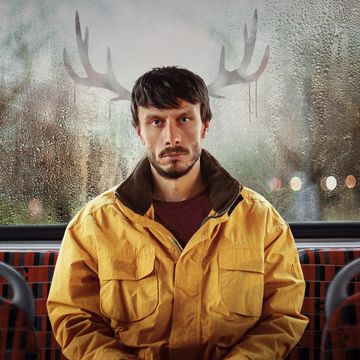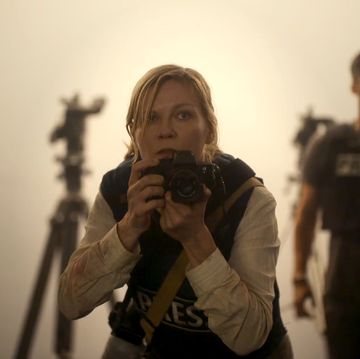Ross Kemp is speedily thumbing at his iPhone, showing me the photos from his recent investigative sojourn with the Kurdish army in Syria.
As he talks about the harrowingly sad and violent impact of war, trademark eyebulge popping 2-inches from his skull, I worry that I'm about to see something I'd rather not.
But the former Eastenders "You wot?" merchant is flicking ahead without fear or concern, which comes as no surprise, really. Over the past twelve years, the 51 year-old actor-turned-reporter has thrown himself into some of the most terrifying situations imaginable, from infiltrating murderous guerrilla armies to diving headfirst into gangland underworlds.
Nothing seems to faze him.
So we sat down with the 'Artist Formerly Known As Grant Mitchell', to find out how he keeps his nerve...
How do you choose what dangerous, war-torn country you're going to visit next?
Over 12 years of making docs, you realise that certain countries have richer seams. Hostile places are full of conflict – and conflict makes a good story. I still get excited about visiting dangerous locations, and as long as I'm still excited, I'll carry on doing it.
How much of that excitement is fueled by the adrenaline of fear?
I'm not an adrenaline junkie. But coming out of something like a firefight safely gives you an overwhelming sense of what it is to be a human being. To be truly alive. It's pretty fucking elating.
One thing you'll be surprised about is how often you laugh in life-threatening situations. At the sheer ridiculousness of it all. It's a weird human reaction to survival.
You've shown a lot of bravery in your past documentaries. Fill us in on your confidence-building tricks.
I don't think my job is about bravery. Most of the "brave" stuff I've done has been out of desperation, which is the mother of invention.
We use really good intelligence sources to scope out our locations, and we generally use ex-military to do a thorough risk assessment. We don't just jump on a plane with a camera and hope.
But you can't always be totally sure that their assessments are correct?
The fear is always there, and that's what keeps you alive. Everyone always talks about how brave I was confronting the armed robbers in the forests of Papa New Guinea, but I was just thinking about staying alive.
We had guns pointed at us. We were thousands of miles from anyone who could help us. My cameraman kept rolling, despite having a WW2 mark one self-loading rifle pushed against his back.
I just made the calculated decision to push their guns down. I said: "We're not going to get down on our hands and knees." What other option did I have? I just didn't want to die.
I don't know to what extent my acting in Albert Square has contributed to how I act in those situations. I never have the time to analyse it.
What kinds of thoughts go through a man's head in a situation like that? Or when bullets are whistling through your ear fuzz?
It's cliché, but you think about your life. About the things that are important to you. What your reasons for being here are, and whether you can fulfill them.
So it makes you a better person?
In the moment, you swear to be a better person. But you soon fall back into the same routine. Of nipping people to parking spots, and getting annoyed at old ladies in the supermarket who can't find their change. But I'm a very different guy to who I was back in the Eastenders days.
Has it had any detrimental effects to your mental health?
After seeing a harrowing event – a murder, a firefight, or even the testimony of a mother in Columbia whose son has been cut up alive on a butcher's table – we do something calling T.R.I.M (Trauma Risk Management).
It's a technique we took from the marines. Basically, it's just sitting down and discussing the day. A lot of the time, we might be feeling guilty, or responsible for letting someone down, which can later lead to PTSD. We all talk about how we saw the day's situations, and get a bigger, better picture. It's not rocket science – it's just talking.
But you've got to have a pretty good, dark sense of humour, otherwise you'd just be crying all day.
You meet some proper bastards in your travels. Do you ever try to find sympathy for the unsympathetic?
I don't. But it is my obligation to present people fairly, regardless of how repulsed they make me feel.
Once, a guy started to cry as he told us how many young women he'd killed – over 400 girls. He trafficked thousands a year. His search for sympathy fell on barren ground. It just made him look more despicable, by trying to use it as a cathartic experience.
On that occasion, I told the camera that I wanted to kill him. That they should get him out of my sight. Although he did have five heavily armed guards with him, so I'm not sure what I could have done.
Your new documentary follows the Kurds in Syria and Northern Iraq fighting against ISIS. What did you find out on the ground?
It's not a propaganda film for the Kurds, but it does show that they've made massive advances. The caliphate, which was prophesied to expand, has shrunken. I don't think that would have happened without the Kurds, both in Iraq and Syria. The tide is most definitely turning.
Ross Kemp: The Fight Against ISIS premieres on Sky1, Thursday 14th July at 9pm.













